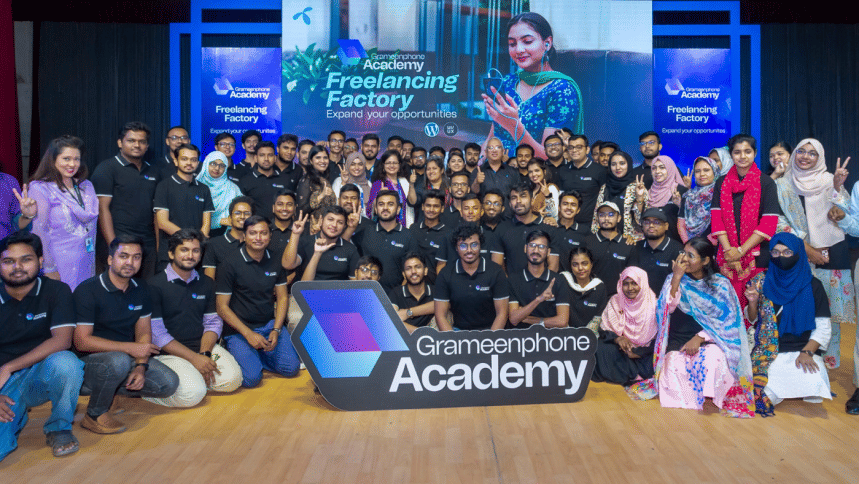Grameenphone Academy: Bridging education gaps in Bangladesh

According to the Population Census, in the past decade, Bangladesh's literacy rate has gone up from 51.77% in 2011 to 74.66% in 2022. However, this success in education has not directly translated into employment opportunities for graduates. According to reports from the World Bank, the unemployment rate among educated youth in Bangladesh has tripled during almost the same period.
This paradox highlights a critical gap: the disconnect between educational curricula and modern industry demands. Additionally, even those with skills often cannot effectively use these abilities in our competitive job market. That's where Grameenphone Academy comes in. This initiative, powered by Grameenphone, stands out as a unique platform offering free education focusing on practical skills tailored to bridge the existing skills gap in the local job market.
Grameenphone Academy was initially conceived to keep youth engaged and productive during the Covid-19 pandemic. The journey began in late 2020 with a concept testing phase that involved just ten students from the Islamic University of Technology (IUT), focusing on online training in design thinking.
Regarding the initiative, Farhana Islam Teresa, Head of ESG at Grameenphone, said, "We initially started by training just ten students. Seeing that first group's remarkable success and transformation truly inspired us and lit a fire beneath us." As the year progressed, the academy expanded its reach in the beta testing phase. In partnership with top edtech providers, it trained 345 students in essential skills such as communication, entrepreneurship, and digital marketing.
This phase was critical for refining the curriculum and honing the delivery methods to ensure the effectiveness and broad accessibility of the platform. By late 2021, Grameenphone Academy was ready to scale its impact and officially launched its platform. It was fully equipped to offer large-scale education that was free and accessible to anyone with internet access.
Moving into 2022 and beyond, the academy shifted its focus. Now, it's about creating measurable impacts by providing hands-on training to develop highly competent freelancers capable of competing in a global marketplace. The aim was to deepen the impact of the academy's programs by linking in-house training with real freelancing opportunities and expanding its reach through strategic partnerships with various edtech firms.
Currently, GP Academy has 133,469 enrollments from students across 167 educational institutions and has issued 63,474 certificates. Notably, the academy has made significant strides towards gender inclusivity, with 47% of the certifications, amounting to 30,042, awarded to women.
Farhana Hossain Shammu, Head of Grameenphone Academy, expressed her enthusiasm about gender inclusivity, stating, "Achieving 47% female certifications organically is a significant milestone for us. It's truly heartwarming to witness these women empower themselves and positively impact their lives."
Their engagement initiatives, including 30 campus town halls and masterclasses, further enhance this commitment to fostering an inclusive learning environment. These events provide real-time, interactive learning experiences, bolster direct engagement, and help GP better understand its users' needs.
Shammu explained, "We don't just focus on digital learning. Our mix of in-person events and online courses drives forward a comprehensive educational experience that prepares our learners for the real challenges and opportunities in the marketplace." She further stated, "The in-person events also help us understand our students on a much better level."
After the success of the digital courses and in-person events, GP Academy has taken on its latest challenge: the Freelancing Factory. This initiative is tailored to address the pressing challenges and opportunities within the Bangladeshi job market.
With an annual challenge of integrating 1.9 million young individuals into the workforce, the need for practical and marketable skills is more crucial than ever. Through the Freelancing Factory, GP Academy aims to transform this demographic challenge into an opportunity by equipping youth with skills directly applicable to the global digital economy.
But what's the challenge here? Shammu highlighted the program's ambitious goals: "Out of 600 applicants, we carefully selected 100 students for the Freelancing Factory. We are training them to initially earn $100 in three months and aim for $1,000 in eight months through freelancing." She added, "The hardest phase is often the zero-to-one transition, and we want to help these students through that."
GP Academy is more than just an educational platform. Teresa summed up the academy's vision: "It's a movement to empower the youth of Bangladesh with the knowledge and skills they need. From the GP Startup Accelerator to the GP Academy, we are cultivating a culture of growth and opportunity that extends beyond our corporate boundaries and truly grows our future."
This vision is illustrated through the success stories of GP Academy. Success stories of individuals such as Khadiza, an economics student at Begum Badrunnessa Govt. Girl's College, who became an expert in Facebook marketing and MS Excel. Now, she earns BDT 10,000 - 15,000 per month from her small setup. Or take Muntasir, for example. He went from financial instability to becoming a mentor at the Freelancing Factory's web development course.
These are not just one-off stories. In a country of billions, there are millions of Khadiza and Muntasir waiting for the opportunity to learn and grow. That's what GP Academy offers.
Ankit Sureka, Head of External Communications at Grameenphone, reflects, "Where we live and work, it's easy to take education for granted. However, education is a privilege that should be available everywhere for everyone. At GP Academy, we operate on a non-profit basis to ensure that learning reaches every corner of society regardless of the obstacles."
In a country where practical and accessible education often does not go hand in hand, initiatives like Grameenphone Academy are vital in bridging the gap within our educational system. However, the biggest highlight of GP Academy is the people behind it. It is their collective enthusiasm towards their inclusive goal: education for all, at no cost at all.

 For all latest news, follow The Daily Star's Google News channel.
For all latest news, follow The Daily Star's Google News channel. 








Comments